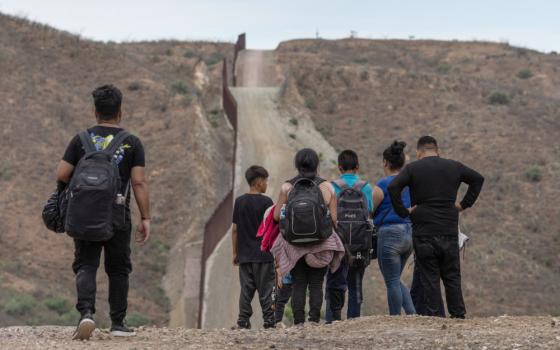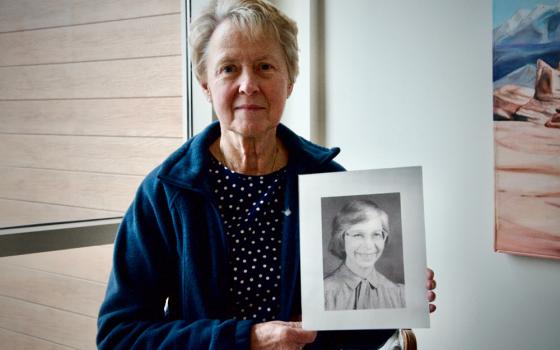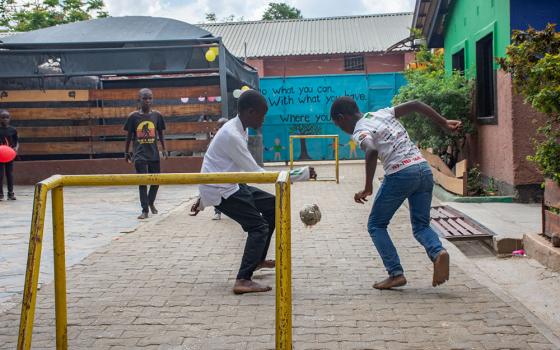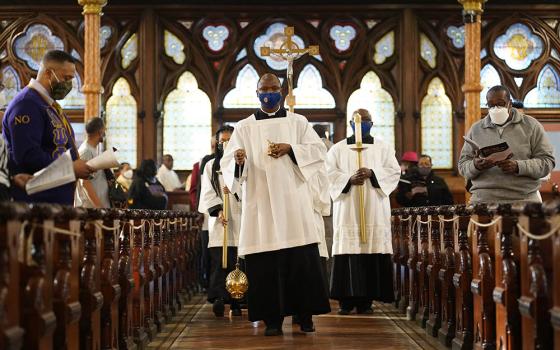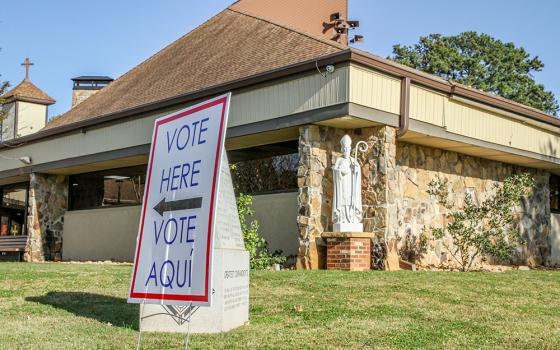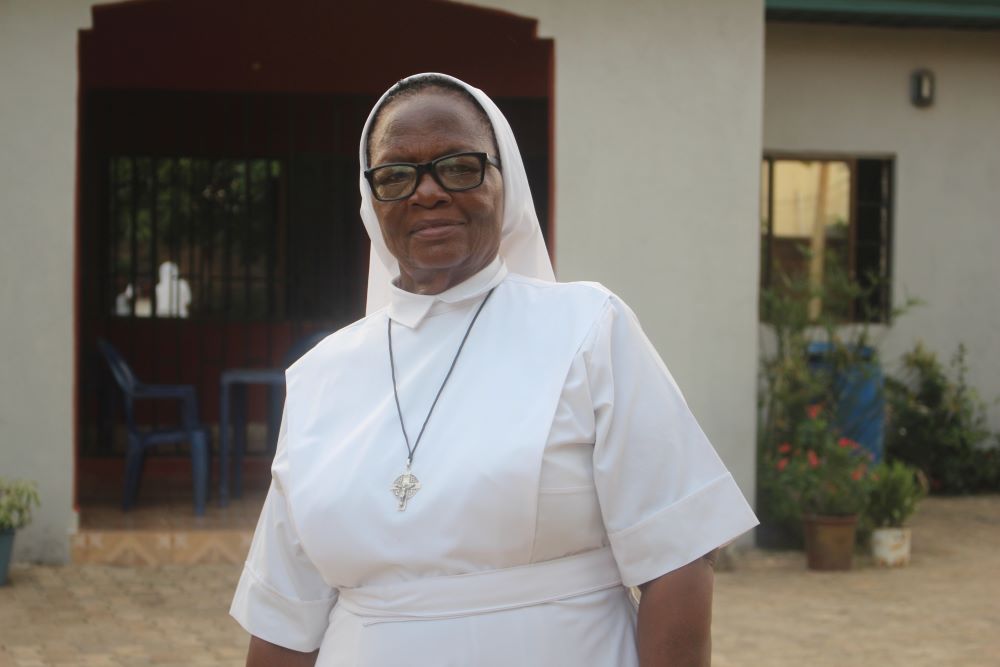
Sr. Esther Ezedinachi, of the Handmaids of the Holy Child Jesus, supports victims of violence in the southeast region of Nigeria. (GSR photo/Valentine Benjamin)
Sr. Esther Ezedinachi, of the Handmaids of the Holy Child Jesus in Nigeria's Diocese of Ekwulobia in the southeastern state of Anambra, runs Ancillacare. The organization provides emergency humanitarian support, food, clothing and health care to the homeless, impoverished and mentally disabled people who are victims of violence in the southeast region of Nigeria.
Ezedinachi was born in December 1956 to the late Mr. and Mrs. Jerome Ezedinachi, both traders in Benin City, the capital of Edo State, Nigeria. She relocated to the state of Anambra at age 5 to live with her paternal grandmother in Nimo, a small town where she attended St. Mary's Primary School in Egbengwu, Nimo, and received her school leaving certificate in 1972. She proceeded to Abbot Girls Secondary School, Ihiala, where she obtained a certificate from the West African Council Examination in 1977.
Speaking to Global Sisters Report at the Handmaids of the Holy Child Jesus convent in Umuchukwu, a small village in Anambra State, she said her consecration wasn't by accident but by divine providence. Her desire for religious life began to blossom during her elementary school days in her hometown of Nimo.
“I started having the urge to join the religious life right from my primary school,” she said.
She suffered strong opposition from her mum, who wanted her to get married, but she had no interest. She decided to seek the help of her cousin, who gave her a letter of recommendation to join the religious life.
After completing high school in 1977, Ezedinachi enrolled in Federal Polytechnic Oko, where she studied educational biology and earned a Nigeria Certificate in Education in 1993. She progressed to Abia State University and graduated with a bachelor's in educational management and planning in 2005.
She joined the Handmaids of the Holy Child Jesus in 1978 and made her first profession in 1980 at St. Anne's Cathedral, Ikot Ekpene, Akwa Ibom. She returned to profess perpetual vows in 1987.
Ezedinachi celebrated the silver jubilee of her first profession of vows in 2005. She has worked in many communities as a teacher and a social worker. She says this was made easy by her special love for the less privileged in society.
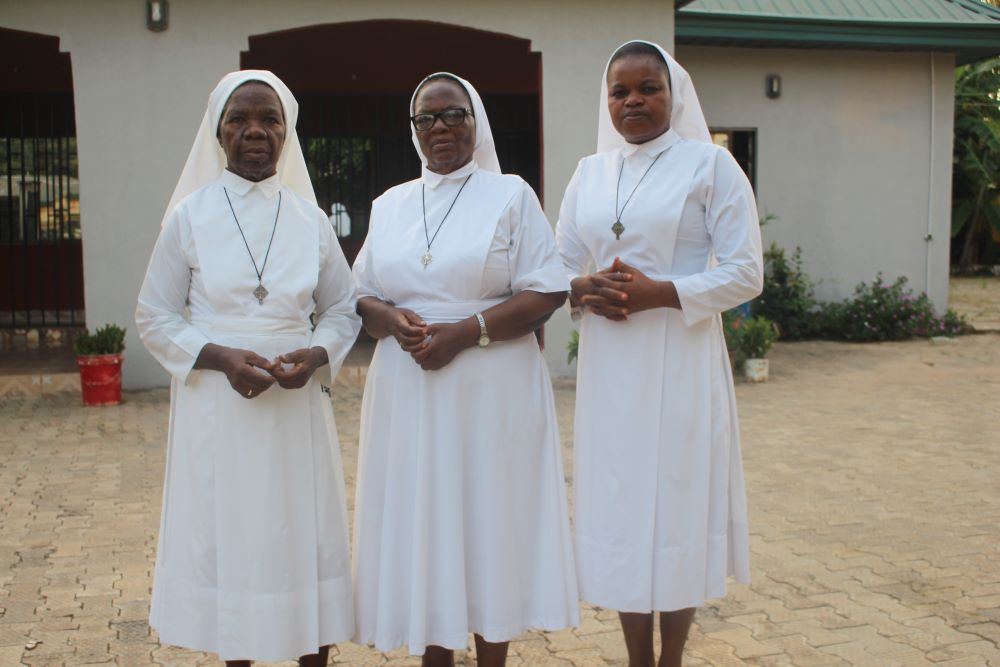
Sr. Esther Ezedinachi (middle) poses for a photo with two other nuns working with her in front of the convent of the Handmaids of the Holy Child Jesus in Umuchukwu in Anambra, Nigeria. (GSR photo/Valentine Benjamin)
She started her ministry, Ancillacare, in 2021 and has been active at least twice every week, especially on Sundays, providing cooked meals for indigent and marginalized members of society, some of who are homeless and have developed mental health issues and are in danger of being harmed, abducted or killed in their communities.
GSR: What motivated you to start your ministry, Ancillacare?
Ezedinachi: I am doing this because I was moved in sympathy, seeing these suffering and mentally [disabled] men and women in the marketplaces and streets with virtually no one seen to be caring for them. I could not hold my emotion, so I took up the apostolate, and in doing so, made myself a beggar to give them something to eat.
This situation really affects the mental state of the people because they constantly live in fear. So, we give them hope by encouraging them through counseling and physical interaction with them.
What motivated me to start the ministry was simply my desire to do something that enhances their humanity by alleviating their sufferings, showing them some human love, giving them something to eat and drink, even though not as regular as it should be, providing them with medical [treatment] and also clothing them.
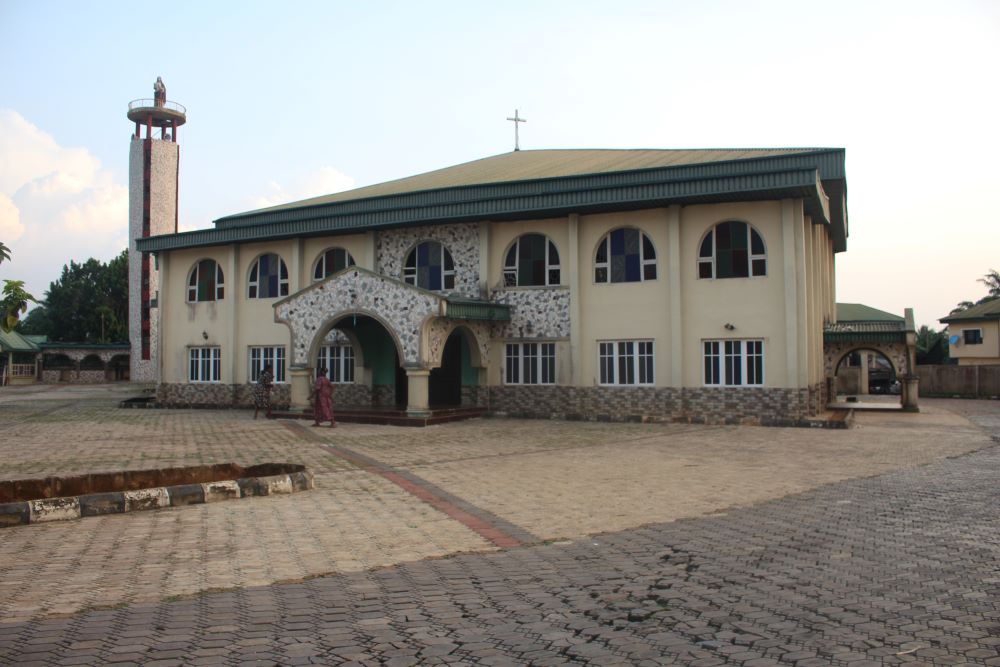
St. Jude's Catholic Church in Umuchukwu in Anambra, Nigeria (GSR photo/Valentine Benjamin)
As a nun, what does your guiding phrase, "feeding Christ through them," represent?
Christ taught us to love and care for one another. By his example, he fed 5,000 people with five loaves of bread and two fish. He cared for their physical ailments. This action also inspired me to meet the needs of these mentally [disabled] men and women in the marketplaces and streets and even those in their homes.
Many people suffering from depression don't recognize it as an illness. Others turn to street drugs like codeine rather than medications, which are often unaffordable. How much of a problem is this, and how has your work addressed this problem?
Depression is a mental illness often attributed to witchcraft attacks in Nigerian society, and this is a huge problem. That is why I am working and making efforts to establish a rehabilitation center for those in this situation, to provide rehabilitation services and reintegrate them back into their communities and families.
Would you say that the problem of violence is more societal than spiritual?
Violence affects both physical and spiritual, but more on the spiritual because of the fear of armed militias who are maiming and killing unarmed citizens here in the southeast region.
You offer training to young people to work as trauma and bereavement counselors. Who are they?
We have the local counselors, young men and women, over 50 of them in this hall (pointing). So, we train them to counsel people in this situation. They are locals who encounter some of them regularly. We offer this training to have enough workers in the field to help in counseling and directing these young men and women displaced and seen wandering from one place to another.
Advertisement
How are you able to stay afloat?
In all we do, we trust in divine providence, which our foundress, Mother Mary Charles Magdalene Walker, servant of God, anchored on during her life. She loved the poor and served the poor.
Is there any spiritual connection between your Catholic faith and your work?
Christ said that whatever you do to the least of these people, that is done to him (Matthew 25:40). So, the apostolate is doing what God wants us to do.
What is your advice to people dealing with insecurity and humanitarian challenges in their communities, and how is your work an example to other sisters working in Africa and around the world?
My advice is to encourage them to remain faithful in their ministries and always stand for the truth. Our ministry is a shining example for others to emulate or encourage. Feeding the poor in Christ is an apostolate that "X-rays" the life of Christ in different ramifications.

